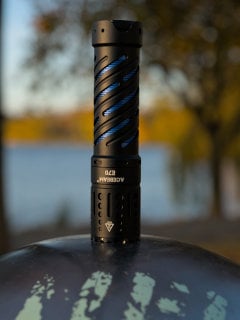I’ll second PurelyMail. Easy to set up and they have explainers for all the various settings. I pay $10 a year for “unlimited” domains and mailboxes (some caveats but for minimal mail we won’t hit any limits).
- 0 Posts
- 22 Comments

 3·5 months ago
3·5 months agoI do, that’s why I thought that site was less ad-riddled. I didn’t even get that pop up.

 2·5 months ago
2·5 months agoOriginal article without all the giant ad interruptions.

 3·10 months ago
3·10 months agoI like my Sofirn HS40. It only has a few modes but it has USB-C charging, a fixed right angle, and water resistant to 2 meters submersion. Throw the magnetic tailcap on there and you can stick it where you need to.
 1·1 year ago
1·1 year agoWith regards to app management the Unix way is the way. You’ll have individual tools that you can spin up or take down at will. When something needs maintenance, or it crashes, all your other services will stay running.
As to an attack surface, that can be mitigated by using a VPN if you need access from outside your network. Then you’re back to an individual tool doing one job really well (and probably being audited for that by outside parties).
Databases are a slightly different challenge but you can still think of them in a similar way regarding service availability. If all your services use a single instance then when that instance goes down for maintenance or backups all of your services will be offline.
Similarly there can be issues with compatibility between the service and the specific database (and/or version) which could necessitate a dedicated database for a certain service. But if each service (or possibly similar related services) use dedicated database instances then maintenance of that stack is simplified.
I’m of the mind that with the flexibility of containerized software stacks there’s no real reason to have a single monolithic database anymore, certainly not for small, self-hosted, applications that are not under heavy use.
 1·1 year ago
1·1 year agoFor iOS I think the only “automatic” option is Immich.
Nextcloud with the Memories app will be similar but I believe you have to remember to open the app when you get back on Wi-Fi.
 1·1 year ago
1·1 year agoFrigate can run in its own container and provide its own web GUI. You get extras if you integrate it with Home Assistant but if you think those aren’t worth spinning up an instance, then you don’t have to.
Blue Iris is another good option if you don’t mind Windows (blah I know but at least it’s still self hosted and fully under your control).

 201·1 year ago
201·1 year agoStacher is a great GUI for yt-dlp on Windows and MacOS.

 1·1 year ago
1·1 year agoThat is a cool option I hadn’t thought of trying.

 2·1 year ago
2·1 year agoBut they can pull different quality profiles based on your list preferences right? I don’t see why you need one instance for downloading 4k and one for 1080p.

 11·1 year ago
11·1 year agoI believe these are “remux” when searching. I don’t think anyone posts an ISO but the remux contains the entire contents of the original disc but in a friendlier format for playback on more diverse hardware (mkv containers for instance instead of the bdmv container).

 2·1 year ago
2·1 year agoCan you elaborate on why you’d need two instances of radarr/sonarr running at once?

 6·1 year ago
6·1 year agoThey aesthetic choices of the movies directly reflect the events of the story. Voldemort coming back into power literally drained all the joy out of the wizarding world for those who knew and understood what was happening. The story turned from one of discovery to one of self preservation.
Voldemort let dementors loose to feed on any joy they could find, no wonder the characters became jealous and petty. Then the sense of impending doom from the threat of Voldemort or his followers and their terrorist style attacks meant that any gathering that could have been joyous turned downtrodden and melancholy.
The tone of the films reflect these events. The films didn’t touch on the prevalence of the dementors except briefly, so instead they showed the constant cloudy grey skies. The sense of impending doom is seen in the darkness of the scenes. In settings where the characters can be more free or relaxed the scene is brighter and more colorful. In settings where that relative safety is more easily broken the scene is dark and foreboding.
I’m not trying to say the movies were all perfect gems that got everything right, but the stylistic choices for scene and lighting I think were used to emphasize the greater tone of the events as seen by the characters.

 7·1 year ago
7·1 year agoThis is the way. Exactly what I’m doing for my old iPad mini that can’t get any of the new streaming apps. I download some videos and upload them to the iPad with VLC’s web interface. Super easy and then they’re always available, internet or no.

 14·1 year ago
14·1 year agoAlabama
Georgia
Kansas
Nebraska
Oklahoma
Texas
 25·1 year ago
25·1 year agoIt’s swipe to reply.
To save everyone from having to read a far too long piece just to find out what the clickbait-ey title is referring to.



If you can get IKEA where you are the INSPELNING line has Zigbee smart plugs with energy monitoring for only like $12. I believe they have a UK variant as well.